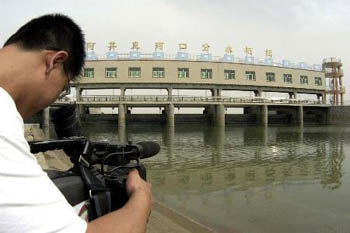| Home / English Column / Environment / Environment -- What's New | Tools: Save | Print | E-mail | Most Read |
| Waste Threatens Bagrax Lake in Xinjiang |
| Adjust font size: |
Excessive discharge of waste water has made the Bagrax (Bosten) Lake in northwestern China's Xinjiang Uygur Autonomous Region salty, endangering one of the leading water sources of the arid region. The lake, located in the southeast part of the Yanqi Basin in central Xinjiang, has a drainage area of some 1,001 square kilometers and is the largest inland freshwater lake in China. The circulation of the Bagrax Lake greatly degenerated in recent years as more than 487 million tons of agricultural, industrial and household waste water carrying more than 700,000 tons of salt flow into the lake annually, said Zhang Handong, vice head of the Bayan Gol Mongolian Autonomous Prefecture. Together with some 1.1 million tons of salt brought to the lake by other surface runoffs, at least 50,000 tons of salt deposit in the lake, said Zhang, adding the minerals in the lake rose to 1.32 grams per liter in 2005 from 1.17 grams per liter in 2000.
Besides water quality degradation, the wetland around the lake is also shrinking, posing a serious threat to the habitat of the birds, like widgeons and wild goose, said Zhang. The prefecture government has formulated its first lake protection regulation in a move to stop the Bagrax Lake from being polluted. The regulation details specific environmental protection measures around the lake and penalties for violations, said Zhang. (Xinhua News Agency June 21, 2006)
|
| Tools: Save | Print | E-mail | Most Read |
 |
| Related Stories |
|
